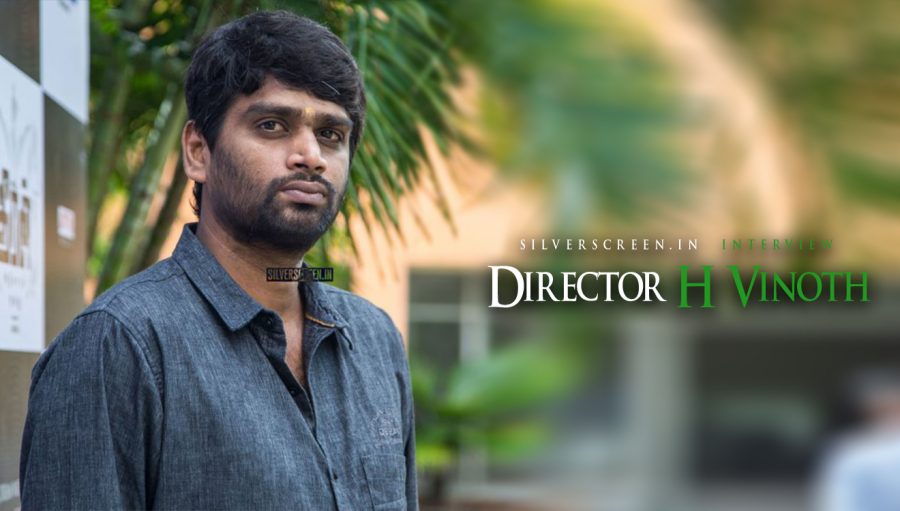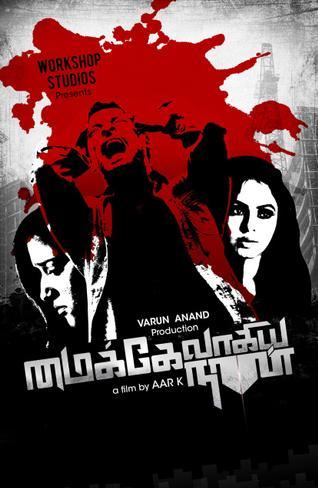After watching a movie so intense and one that has opened to rave reviews, you expect to speak to a director who is gung-ho and waiting to tell you how he created a world that fuses the dark and the righteous in Theeran: Adhigaram Ondru. Instead, you hear someone dismissive of any undue praise, and bearing the quiet confidence of a person who’s done a job well. There’s a matter-of-factness about H Vinoth Kumar that can be misconstrued for disinterest. But, soon enough, you realise that’s because all the excitement was spent fuelling his creation; it’s only his next film that will see that fountain spring forth again.
***
Connections have played a very important role in director Vinoth’s life. Be it the numerous circuits he said hello to during his polytechnic course in Taramani, or the wires and spare parts that were his friends when he worked for companies small and big as an electrician/service technician. Actually, you can travel back even earlier. Many things took place at various points in his life leading to this moment of reckoning.
“I used to love reading stories, a habit picked up when my father, a farmer and clerk in the Cooperative Society in my Chinnapallikuppam village, returned from Vellore, 40 km away, with magazines such as India Today and Mutharam. The village akkas, rather their stash of Maalaimadhi, Rani Muthu and more, delighted me too. Later, Rajesh Kumar, Balakumaran and others entered my life,” says Vinoth with not a tinge of nostalgia.
That’s because it defines his present, is his thriving reality and is not locked into a memory box. “Everyone asks if I grew up with a deep love for the movies, But, no, I would rarely watch movies, may be twice a year. I would watch everything; absolutely no restrictions on the genre. You must understand that theatres were not close by; sometimes, we travelled 10 kilometres or more. Returning was an issue if it got late; so no, night shows. It was like a festival if we got to watch a movie. I would get to watch an extra movie or two if we visited a relative in the city. Then came TV; that was another festival. The village would gather to watch the rare 11.30 pm Tamil movie on Doordarshan.”
***
And then, he became a Chennaivaasi, and continued working there. “Sometimes, you feel you’re doing what you’re meant to do. Your career does not progress. In 2003, when I was around 21, I decided to write stories. I think it was rooted in the excitement I felt when I read and narrated stories. I wrote many one-page shorts, and did not even receive rejection slips. But, armed with blind confidence, I decided to enter the movies.”
The fates worked to keep the connections to his final destination alive. He met like-minded friends, scoured addresses of directors from newspapers, became a personal assistant of sorts to R Parthiepan, and an assistant director on his Pachchai Kuthirai. Then came the twist. “I realised I had come without any knowledge; that was wrong. I had no clue what was happening on the sets. I decided to leave the industry.”
But, the love story with all things electronics was short lived; he jumped headlong into films again. He spoke and discussed films with friends, met director Raju Murugan through his brother, and went on the greatest learning of his life. “This was a movie before Cuckoo; it did not take off. My 18 months with him is among the most precious. Spend six months in his company and your life will change,” he says. After a brief stint as assistant director on Goli Soda, where he worked on the Koyambedu market portions, the circuit finally got complete for Vinoth, and there was a light ready to glow.
Director Vijay Milton told him that composer-actor Vijay Antony was looking for a script. That was Sathuranga Vettai. But, ultimately, it was cinematographer-actor Natty and actor-producer Manobala who gave light to the fire that had been simmering for long within Vinoth. It was a film on a conman, who ultimately realises what matters.
***
This deep-rooted moral compass is visible in Theeran too; it keeps the lead safe from temptation. Just when you are getting ready to listen to a story on morals and conscience, Vinoth surprises you again. “But, a moral can be wrong too; in that case, we have to break it, but also have a solution for what follows. The questions I raise and the confusions that arise… that is my story. Yes, there might be clichés, but that’s life.”
He continues: “Everyone ridicules clichés. But, who does not live such a life. We keep at it, through our lives. Some processes are a constant; they have to be accepted. Human life begins in a single cell, for instance, there’s a process for the cells to form a nose. You can’t wish that away, without breaking the order of things. But, having said that, in certain things, once you develop the knowledge, you can break the process.”
***
The story of Theeran entered Vinoth’s life sometime in 2005, when he read a news clipping about the gang that murdered a family. Deeply moved, he wrote a short story and filed it with his other creations. Years later, six months after Sathuranga Vettai, while scrolling the newspaper, he saw the same clip in Thina Thandhi’s Varalaatru Suvadugal (something akin to This Day, That Age) section. “I realised I have a story ready and decided to give life to what I’d written. It was terribly amateurish; I’d written it almost a decade ago. I met journalist R Saravanan, who went on to make Kaththukutti, and he introduced me to someone who threw light on the incident. He told me about the history of the criminal tribes of India. I met many officers, and honed the script.” What resulted was a taut thriller, with the darkness of the gang offset by the dedication of a group of police officers.
***
It’s rare to get Vinoth to smile or laugh during an interview, but there’s a lot of humour within him. You saw it in Sathuranga Vettai, and even in Theeran (the portion involving Do Kilometre). And, the root of all these can be traced back to the one overriding feeling that governs his creations. “A film must run. It must make money for the producers and for the numerous people involved in it. I will not say I’m here driven by the passion of movies. I get a high when I see good content, I trip on it; I don’t ever see myself making a film with layers and an extraordinary visual quality.”
Vinoth then breaks down his movie-making process.
*Will this sell or not?
*What is the range of this movie/How far can this content go?
*Choose actors.
*If they agree to come in, what will their audience want?
*Write in a manner that will take the audience one step towards good cinema.
*Make a good film, with your style but also commercial value.
“Ivlothaanga,” says Vinoth. “These govern my thinking. The majority of our audience is not used to a certain kind of movie-making; you can’t push them directly; you have to nudge them towards it.”
And that is how the romance angle and the ‘item’ number got into the film. “People wonder if it was forced; it was a well-thought out move. A section calls to say they are watching the movie a second time for the romance. The song has clicked big time in Telugu (Khakee). No, I won’t call these compromises; that’s a big word. But, it has to be viable for producers. I do make changes in the space I inhabit. Instead of six, there are just two songs. I will do more once I get more space. Someday, pure cinema will emerge.”
That way, Vinoth is in awe of filmmakers such a Thiagarajan Kumararaja. “They have the strength of vision. I will get there someday.”
***
Towards the effort to reach his idea of perfection, Vinoth avoids watching his creations in the theatre. “Watching it reminds me of what I could have done better. And then, if the audience laughs, I might get influenced and continue in the same vein. If they don’t react in the place I meant them to, I might get disappointed and change my style. I focus only on what I have to say, say it, and keep going.”
He watches creations by others, though, for his dose of learning and entertainment. He reels off names… Mysskin, Vetri Maaran… they amaze me in how they persist till they get it right. Bramikka vekkaraanga (they leave me in awe). I admire Martin Scorsese. “It’s only by watching others that your craft evolves.”
So, what kind of movies does Vinoth see himself making? Will there be an overriding emotional leitmotif? “I don’t really know. What I know is that my films should raise questions. If someone has the same questions, it will give him/her an answer. That said, a film is not a means to an end, or a lesson in how to deal with situations. It is the result of the churning in my mind.”
And, he’s particular about a defining moment in every cinema. I hazard a guess. In Theeran, it has to be the scene of the young officer saluting Theeran. “That’s me,” Vinoth finally smiles. “I’m that boy, who’s removed the dust off files and tracked the story. That’s my salute to those involved in the operation.”
Vinoth has also written the story for Sathuranga Vettai 2, which is under production, directed by Nirmal Kumar, and starring Arvind Swami and Trisha. “I’d originally written it for a new face, and once Arvind sir came on board, we changed the story a bit,” he says.
Recommended
A week or two down the line, Vinoth hopes to get cracking on his next script, “something in fiction, vastly different from my first two films”. He will figure out his theme and speak to people involved with something similar, take notes, observe them at work… “Writing a story is not the difficult part. I need just some days to do that; I can write anywhere. It’s the pre-production that will take time. But, some producers give me hope. It’s not very easy to visualise a film from the story I narrate. But, they trust me, and I’m grateful. That’s what happened with my debut film; it had everyone who was excited by the script.”
With Theeran, everything was on paper. Even the fights. The research was thorough. “I read Vetri Maaran’s publication Oonai Kulacchinnam (Wolf Totem), the Tamil translation of a Chinese book, to study the animals’ hunting techniques — how they hunt when single, as pairs and as a pack; the stunt choreographer had detailed notes about what we wanted; and all I told the cinematographer was ‘brother, I want this look’. When we went to shoot, we worked with greater passion to tide over the practical obstacles. And, it all worked out.”
By now, you can hear the laughter in Vinoth’s voice. “Punch dialogue-a sollanum na, ‘Naamba nallavanga; namakku nalladhu thaan nadakkum”. (We are good, only good will happen to us!)



